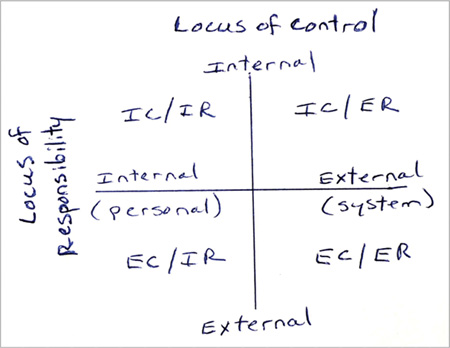In graduate school we often are told to be self-sufficient, motivated, responsible for our own success. That mindset emphasize that source of our problem (and solutions) is internal.
Meanwhile, as we’ve discussed in Solving problem at the correct level you can’t solve external problems by working on the internal side of the equation.
It is your job to work hard, try to be smart, and put good effort into work. But there are many people around you – mainly mentors – who has the job of helping you out. If they don’t, then you can’t solve that problem by working hard. You have to fix the External, by changing mentors, or by managing expectations in a way that minimizes their impact.
Same approach comes to blaming and finding source of problem. Some people, whether in grad school or real world, will lay blame for their mishaps onto others, making it external: “If one X and Y did better! If only my mentor told me to apply for Z!”
Other people “take responsibility” and carry the weight alone, by internalizing everything that happens: “I should’ve known better trust them!”
The truth, as often, lies between two approaches. I have somewhat moved from internalizing to externalizing issues of my PhD experience, and now getting closer to more balanced view.
After we figure out who is responsible for something, we need to understand how to control it and introduce change, which also can be external/internal.

